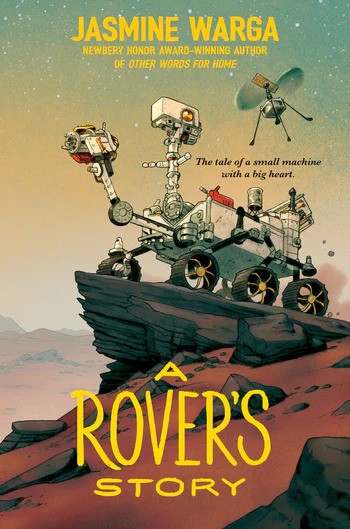 A Rover’s Story
A Rover’s Story
Written by Jasmine Warga
Balzer+Bray, 2022, 294 pp
ISBN: 9780063113923
“Resilience,” built to be logical, not emotional, is a rover created to explore Mars by a passionate team of NASA engineers. Res embarks on a pioneering mission to Mars that includes collecting and transmitting data back to Earth, finding the former rover, and searching for evidence of past life. However, Res’s journey across the harsh Martian terrain encounters unexpected challenges. Despite these obstacles, Res completes his mission, and the team on Earth remains unwavering in their belief in him. In this compelling sci-fi narrative, a blend of hope and a deep sense of caring connects Res and the team, ensuring his return to Earth, and a permanent home for the rover.
A Rover’s Story is a beautifully crafted novel that explores the connection between technology and humanity. Set in an advanced technological era, this story invites readers to ponder the essence of being human and our relationship with technology. Emotions have been considered a distinctively human trait, in contrast with the logical nature of machines. However, this story prompts readers to reflect on the role of emotions in defining what is human as Res develops human-like emotions throughout his journey. The story emphasizes the importance of emotions in human life and highlights the profound impact of forming relationships between humans, between humans and machines, and between machines. The bond Res forms with its creators, Rania and Xander, exemplifies the power of relationships in facing challenges that result in the agency needed to complete an impossible mission. The emotional investment of humans in Res, presented by Sophie’s letters, shows their deep connection and affection, bridging the gap between human emotions and machine logic.
Traditionally, humans have been defined in contrast to non-humans, with only humans seen as autonomous agents who possess emotions. Non-humans have been excluded from the position of subjects and considered as passive objects, disposable according to human needs and desires. Through modernity, rationality has been overly recognized at the expense of emotion. This story creates fissures in these rigid dichotomies and blurs the boundaries between these distinctions. Res makes decisions grounded not only in rationality, which is verified by the analysis of vast quantities of data, but also based on emotions of caring for humans and other robots. Res develops a determined agency to complete missions and finally accomplishes groundbreaking achievements for expanding human knowledge. This book forces us to delve into our dichotomous views of human/non-human, and reason/emotion.
This book makes us re-evaluate the role of science fiction. Science fiction has long been valued for its ability to foster imagination and envision an unknown future. In an era of high technology, we are prompted to ponder the fundamental question of what it means to be human and encouraged to resist any foregone conclusions and focus instead on the ongoing process of transformation (Braidotti, 2017). Science fiction can provide a space to explore the immediate challenges of the unknown future. A Rover’s Story leverages this genre to delve into humanity and our responsibilities in a high-tech society.
A Rover’s Story follows in the footsteps of The Giver by Lois Lowry (1993) to ponder questions of humanity in a future tech society. The Giver explores a controlled, dystopian world where emotions are suppressed, providing a stark contrast to the emotional growth seen in Res. Additionally, The House of the Scorpion by Nancy Farmer (2002) can be read alongside these books to explore the ethical use of technology. Farmer’s novel delves into cloning and the moral dilemmas it presents, echoing themes of identity and humanity seen in A Rover’s Story. These stories collectively encourage reflection on how technology shapes our identities, our ethical choices, and our interactions in the high-tech future world.
Jasmine Warga, the author of this book, brings a unique perspective to the narrative. Born in Cincinnati, Ohio, to a white American mother and a Middle Eastern immigrant father, Jasmine grew up feeling alienated from both cultural heritages but learned to recognize her unique position as an asset to her writing (Rosenzweig, 2020). This multicultural background enriches the story, adding depth and diversity to the exploration of emotions and identity. Warga’s ability to weave complex themes of technology, emotion, and human connection into a compelling narrative, grounded in scientific knowledge and research, makes A Rover’s Story a standout in the genre of science fiction for children.
References
Braidotti, R. (2017). Posthuman critical theory. Journal of Posthuman Studies, 1(1), 9-25.
Rosenzweig-Ziff, D. (2020, March). Chatting with Jasmine Warga. Northwestern Magazine. https://magazine.northwestern.edu/exclusives/chatting-with-jasmine-warga/
HeeYoung Kim, West Texas A&M University
© 2024 by HeeYoung Kim

WOW Review, Volume XVI, Issue 4 by Worlds of Words is licensed under a Creative Commons Attribution-NonCommercial-ShareAlike 4.0 International License. Based on work by HeeYoung Kim at https://wowlit.org/on-line-publications/review/xvi-4/9/
WOW review: reading across cultures
ISSN 2577-0527
